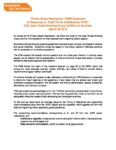PSM Open Ended Working Group (OEWG) on Nutrition Statement
On 28 March 2018, an Open Ended Working Group (OEWG) on Nutrition meeting was held at the Food and Agriculture Organization (FAO) in Rome, Italy. At this event, the Private Sector Mechanism delivered the following statement concerning the development of Terms of Reference (ToR) for the proposed nutrition guidelines that are to be the next major policy product of the Committee on World Food Security (CFS).
On behalf of the Private Sector Mechanism, we thank the Chair of the Open Ended Working Group and the CFS Secretariat for their excellent work preparing today’s session.
We believe strongly that any outcome guidelines must be focused, concise, and based on science and sound evidence. Guidelines should be based on the unique needs of individual countries with an emphasis on vulnerable populations.
The PSM accepts the breadth of food systems and the challenges inherent in covering every aspect, but we believe that the juxtaposition of food environment versus food system is a false dichotomy that would separate food systems.
The PSM shares the vision of the excellent diagram on page 26 of the HLPE report that consumers need adequate quantity, quality, diversity, and safety of food to provide dietary nourishment for good nutrition and health.
To achieve diversity with access to safe, affordable nutritious foods, PSM believes it is essential to frame the major headings of the guidelines in four areas that are already well known and universally accepted throughout the UN system and among stakeholders: access, availability, affordability, and utilization of foods.
PSM appreciates the acknowledgement in the ToR that malnutrition presents itself in many forms, including undernutrition and overnutrition. We feel that the guidelines in their current form do not adequately reflect the needs of both developing and developed countries.
To this end we recommend six thematic areas for the Terms of Reference: two overarching recommendations taken from the HLPE Report and four specifics, which together will form the basis for organizing widely applicable, global guidelines.
The overarching recommendations corresponding to #1 and #7 from the HLPE report, respectively, are:
- Institutional capacity, to address the need to strengthen nutrition within national policies, programmes and budgets and
- Data collection and analysis, as the foundation of all good policies
Given CFS’ likely finite resources, these two would be top priorities, as they underpin success in all areas. Then, we propose the inclusion of the four well-known, widely accepted sections mentioned earlier, presented as:
- Accessibility
- Availability
- Affordability
- Utilization
Within the context of the specific proposed headings and subheadings, PSM notes that the essential needs for consumer nutrition education, fortification, and sustainability are under-represented. We also note that some of the bullet points indicate specific outcomes before the negotiations even start.
The Terms of Reference do not currently provide recognition of the collaborative, innovative, and proactive initiatives that the private sector has successfully achieved and promises to continue achieving in ongoing engagement in scores of countries.
In closing, the PSM would like to stress its commitment to two points: first, to multisector, multidisciplinary collaborations and partnerships that develop appropriate solution pathways to achieve the UN’s 2030 Agenda; and second, to develop Terms of Reference that deliver safe, diverse, healthy and nutritious foods to all people.
Thank you.
-
PSM Statement: CFS OEWG on Nutrition, 28 March 2018
On 28 March 2018, an Open Ended Working Group (OEWG) on Nutrition meeting was held at the Food and Agriculture Organization (FAO) in Rome, Italy. At this event, the Private Sector Mechanism delivered the following statement concerning the development of Terms of Reference (ToR) for the proposed nutrition guidelines that are to be the next major policy product of the Committee on World Food Security (CFS).
Download


